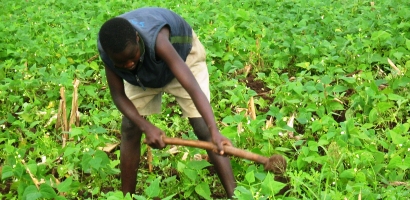Analysis
Will Oil give Uganda what Agriculture has failed?
Peasant agriculture remains dominant despite enormous potential to exploit nature for modern farming
The discovery of oil in the Albertine Graben of Uganda has sparked euphoria and optimism with leaders and ordinary folk attempting to equate it to a magic bullet that will help to transform the country from a least developed country to middle-income status.
Very few people however take time to reflect on the largely untapped vast potential existing in agriculture in Uganda.
This reality dawned on me only a few weeks ago when I travelled to neighbouring Kenya. The road trip that took me from Uganda’s largely lush and fertile plains through the Busia border into Western parts of Kenya to Nairobi and onwards to the country’s semi-arid pastoral areas of Laikipia, poor soils, lack of access to water bodies that can be used for irrigation.
These conditions, while may be attributed to the poor farming practices such as excessive tillage as evidenced by large swaths of opened plots, have conspired to make farming an ardours job.
Despite the apparent hardships, Kenyans are proving that natural adversity is not a hindrance to their determination to not only survive but also thrive in their various agricultural enterprises.
Out of barren soils and frequent weather extremes of scotching heat and floods, Kenyan has risen to become Africa’s second biggest exporter of fruits and vegetables after South Africa.
The country has built a reputation as the biggest exporter of cut flowers to Europe, a major exporter of vegetables such as French beans to Europe as a major exporter of fruits to some of the world’s prime markets.
Kenya’s agricultural performance contrasts sharply with Uganda’s despite our more privileged position as a country gifted by abundant rainfall, ideal temperatures and fertile soils. While Uganda’s agricultural sector supports the livelihoods of majority of the people, it remains largely subsistence, too reliant on nature, dependent on obsolete technology and is therefore unable to lift most people out of poverty.
The paradox of poverty in a land of immense natural endowment has left many people wondering if their expectations from oil, a finite resource associated with environmental, economic and political troubles will lift the country out of despair to prosperity than agriculture.
While meeting business journalists recently, officials from Korea’s Project on International Agriculture (KOPIA) made fascinating presentations that showed that Ugandans are sitting on ‘gold’ by failing to tap into the country’s agriculture potential.
The data showed that almost 50% of Uganda’s land can be cultivated making the country the most fertile in Sub-Saharan Africa. The country’s dual rainfall regime coupled with moderate temperatures, can allow up to four harvests every year.
Related research by America’s USAID indicates that if fully exploited, Uganda can feed up to 210 million people, four times its current population. Besides the physical characteristics, the country’s rapidly growing population, coupled with frequent food shortages in neighbouring countries creates a huge market for the country’s agricultural produce.
Indeed, there are very few countries in the world with conditions that allow seeds to grow with almost no effort at all. Indeed despite Uganda’s vast potential, very few people, have realised the opportunity in Agriculture.
Koreans believe that the paradox of poverty in a land of opportunity is best explained by a mindset of her leaders as well as the general population that fails to appreciate and exploit their natural endowment and a willingness to excel.
Changing people’s mindsets geared towards hard work, diligence and cooperation, and a desire to exploit the immense opportunities surrounding them, would go a long way in harnessing the existing potential, starting with agriculture, so has argued Park Jong-Dae, the South Korean Ambassador to Uganda.
Economists have argued for a competitive advantage in agriculture noting that the sector capable of creating wealth, jobs, and provide a stronger foundation for manufacturing than other sectors.
But the sense that this can be achieved is countered by pessimism that politicians are not about to let the masses rise from slumber and garner economic independence that can challenge their political dominance.
And while the government has talked of using proceeds from oil to develop the country’s infrastructure, modernise our agriculture, and create more durable and sustainable development, evidence from independent analysts suggests that oil could in fact become a curse.
In their report titled; “Contracts Curse; Uganda’s oil agreements place profit before people,” UK-based research firm PLATFORM argues that the contracts signed between the government of Uganda and foreign oil companies largely benefit private interests at a disproportionate cost to the country especially environmental destruction.
Not everyone believes that agriculture is Uganda’s best strategy though. Foremost among the opponents of this strategy is Uganda Federal Alliance President Betti Olive Kamya, who argues that tourism instead is Uganda’s best option to development.
She argues that the country has unique natural features such as wildlife, natural tropical forests and birds that are not found elsewhere in the world, and is thus unlikely to face as much competition as may be the case with agriculture.
But the fact that all these numerous great opportunities have lived with us for ages with little effort made to exploit them suggests that oil will not be any different. Students of how oil and other extractive industries affect development, are almost agreed that governance and accountability greatly determine whether countries rise or fall.
Comments



















